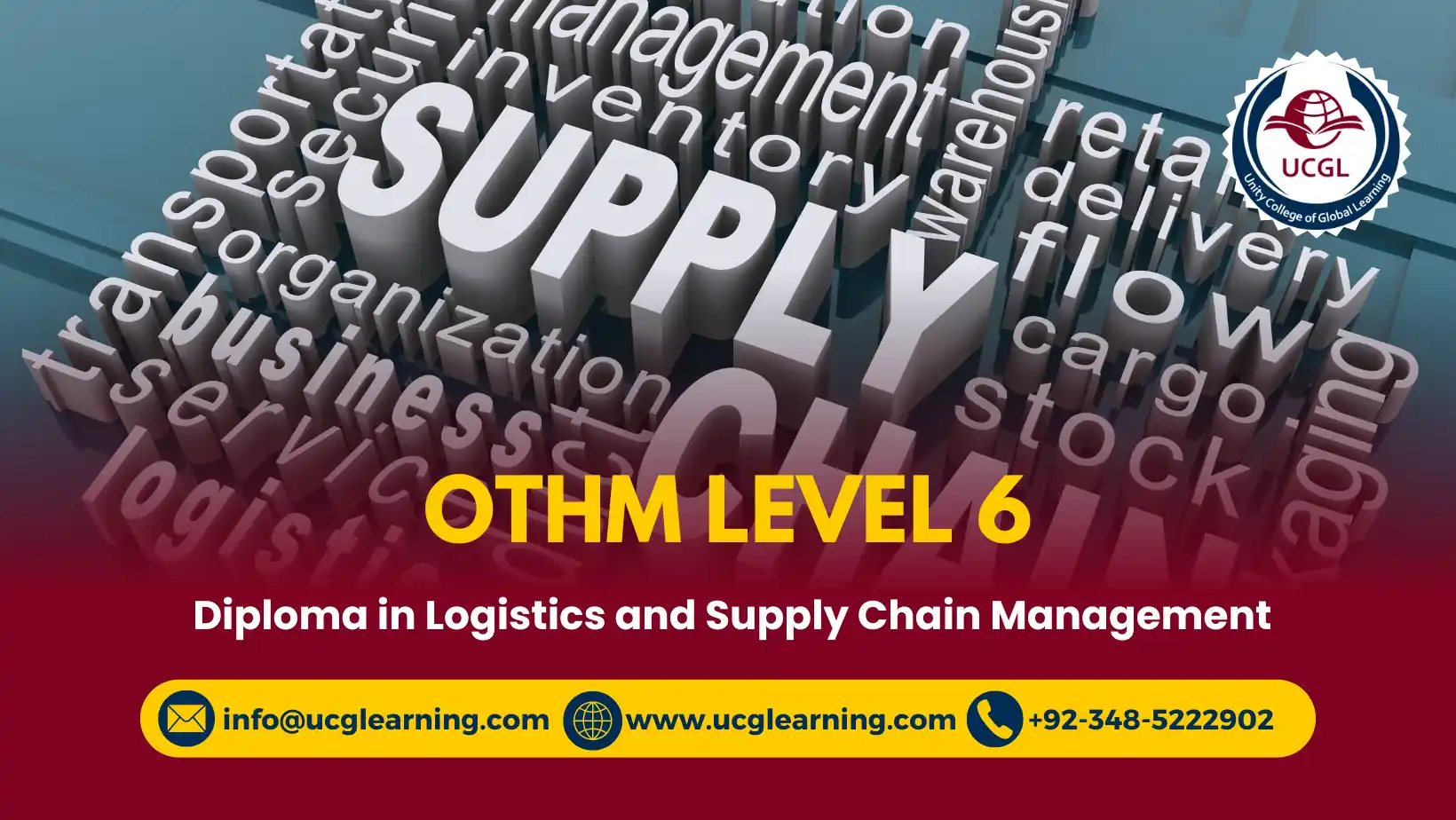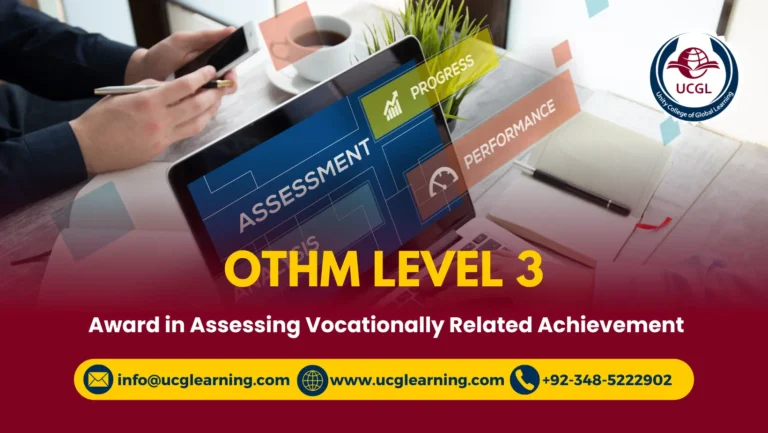OTHM Level 6 Diploma in Logistics and Supply Chain Management
The Level 6 Diploma in Logistics and Supply Chain Management offers a deep dive into the critical components of logistics and supply chain operations. Participants will explore topics such as supply chain strategy, inventory management, transportation logistics, procurement, risk management, and sustainability. The program emphasizes practical skills development alongside theoretical insights, preparing graduates to lead in dynamic and competitive global markets.
Course Introduction
Welcome to the Level 6 Diploma in Logistics and Supply Chain Management, a comprehensive program designed to equip participants with advanced skills and knowledge in managing the intricate operations of logistics and supply chain networks. This diploma prepares individuals to tackle the challenges of global trade, optimize supply chain efficiencies, and drive organizational success through strategic logistics management.
Course Benefits
- Strategic Management Skills: Develop strategic thinking and decision-making capabilities to optimize logistics and supply chain operations.
- Industry-Relevant Knowledge: Gain insights into best practices and emerging trends in logistics, supply chain management, and global trade.
- Operational Excellence: Learn techniques to enhance efficiency, reduce costs, and improve customer satisfaction through effective supply chain management.
- Career Advancement: Enhance career prospects with a recognized qualification that demonstrates expertise in logistics and supply chain management.
Course Study Units
The Level 6 Diploma in Logistics and Supply Chain Management covers a variety of study units, including:
- Entrepreneurship Development (20 credits)
- Global Logistics and Supply Chain Management (20 credits)
- International Logistics Management (20 credits)
- Project Management (20 credits)
- Strategic Procurement (20 credits)
- Supply Chain Planning and Control (20 credits)
Learning Outcomes
Entrepreneurship Development (20 credits)
- Business Planning: Develop comprehensive business plans, incorporating market analysis, financial projections, and growth strategies.
- Entrepreneurial Mindset: Cultivate entrepreneurial skills such as creativity, innovation, and risk-taking to identify and capitalize on business opportunities.
- Startup Management: Implement effective management practices for startups, including resource allocation, marketing strategies, and organizational development.
- Business Networking: Build and leverage networks to foster partnerships, secure funding, and support business growth and sustainability.
Global Logistics and Supply Chain Management (20 credits)
- Global Supply Chain Strategy: Develop and implement global supply chain strategies aligned with organizational goals and international market dynamics.
- Logistics Network Optimization: Optimize logistics networks, including transportation modes, distribution channels, and inventory management across global markets.
- Risk Management: Identify and mitigate risks associated with global logistics operations, ensuring resilience and continuity in supply chain activities.
- International Trade Compliance: Ensure compliance with international trade regulations, tariffs, customs procedures, and import/export laws.
International Logistics Management (20 credits)
- Cross-border Logistics: Manage cross-border logistics operations, including customs clearance, freight forwarding, and international shipping.
- Logistics Outsourcing: Evaluate and implement outsourcing strategies for logistics functions to optimize costs and enhance operational efficiency.
- Supply Chain Visibility: Enhance visibility and transparency in international supply chains through technology-driven solutions and collaboration with global partners.
- Cultural and Legal Considerations: Navigate cultural differences and legal frameworks in international logistics to facilitate smooth operations and business relationships.
Project Management (20 credits)
- Project Planning: Develop detailed project plans, defining scope, objectives, milestones, and resource requirements.
- Project Execution: Execute project tasks, monitor progress, and manage stakeholder expectations to ensure project deliverables are met on time and within budget.
- Risk Assessment and Mitigation: Identify project risks, assess their impact, and implement risk mitigation strategies to minimize disruptions and achieve project goals.
- Team Leadership: Lead project teams effectively, fostering collaboration, motivation, and accountability among team members to drive project success.
Strategic Procurement (20 credits)
- Strategic Sourcing: Develop and implement strategic sourcing strategies to optimize supplier selection, negotiation, and contract management processes.
- Supplier Relationship Management: Build and maintain strong relationships with suppliers to enhance collaboration, innovation, and value creation.
- Cost Management: Control procurement costs through effective cost analysis, budgeting, and total cost of ownership (TCO) considerations.
- Ethical Procurement Practices: Ensure ethical sourcing practices and sustainability considerations are integrated into procurement strategies and supplier engagements.
Supply Chain Planning and Control (20 credits)
- Demand Forecasting: Utilize demand forecasting techniques and tools to anticipate customer demand and optimize inventory levels.
- Inventory Management: Implement inventory control strategies to minimize stockouts, reduce holding costs, and improve supply chain efficiency.
- Production Planning: Develop production schedules and capacity plans to meet demand requirements while optimizing resource utilization and minimizing lead times.
- Performance Measurement: Monitor and evaluate supply chain performance using key performance indicators (KPIs) to identify areas for continuous improvement and operational excellence.
These learning outcomes equip participants with the knowledge, skills, and competencies required to excel in various aspects of entrepreneurship, global logistics, international trade management, project management, strategic procurement, and supply chain planning and control within the dynamic and competitive landscape of business and logistics.
Who is This Course For?
The Level 6 Diploma in Logistics and Supply Chain Management is suitable for:
- Logistics Professionals: Seeking to advance their careers in logistics, transportation, and supply chain management roles.
- Supply Chain Managers: Looking to deepen their strategic management skills and operational expertise in supply chain optimization.
- Graduates: Interested in entering the logistics and supply chain field and acquiring specialized knowledge and skills.
- Entrepreneurs: Planning to start or expand businesses requiring effective logistics and supply chain management.
Future Progression for This Course
Completion of the Level 6 Diploma in Logistics and Supply Chain Management opens up several progression pathways, including:
- Master’s Degree: Pursue advanced studies in logistics, supply chain management, or business administration to specialize further in areas such as global logistics, supply chain analytics, or operations management.
- Professional Certifications: Obtain industry-recognized certifications such as APICS (Association for Supply Chain Management), CSCP (Certified Supply Chain Professional), or SCProTM (Supply Chain Professional).
- Senior Management Roles: Advance to senior positions such as Logistics Director, Supply Chain Manager, Operations Manager, or Chief Supply Chain Officer (CSCO) within multinational corporations or logistics firms.
- Consulting and Entrepreneurship: Become a logistics consultant or start your own logistics and supply chain management consultancy, applying acquired skills and knowledge to advise businesses on optimizing their supply chain operations.
The Level 6 Diploma in Logistics and Supply Chain Management offers a transformative learning journey designed to equip participants with the strategic insights, technical skills, and industry knowledge necessary to excel in the fast-paced world of logistics and supply chain management. Whether you aspire to streamline global supply networks, enhance operational efficiencies, or drive sustainable practices, this diploma provides the expertise to achieve your professional goals. Embrace the challenges and opportunities of logistics and supply chain management by enrolling in this comprehensive program and embark on a rewarding career path in global trade and logistics.







